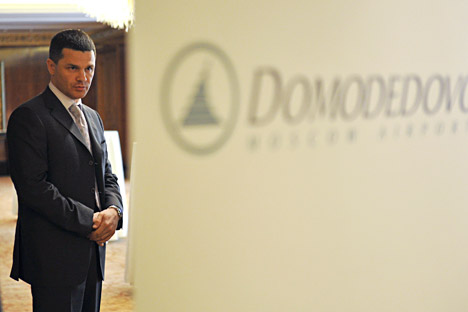
Dmitry Kamenschik, the owner of Domodedovo, the country’s only privately held airport. Source: Artem Zhitenev / RIA Novosti
Russia’s Federal Anti-monopoly Service (FAS) has proposed new legislation that will require foreign investors who wish to purchase shares in companies considered strategic by Russia to disclose their shareholders.
The proposed rules will subject foreign investors to more stringent requirements than Russian investors, but experts say that the rules should not affect levels of investment.
Igor Artemyev, head of the FAS, said that the main obligation of foreign firms under the new rules will be to provide accurate information about their shareholders.
However, the new rules are unlikely to have much effect. At the moment, foreign companies often acquire a license for strategic activities in Russia through a Russian subsidiary so that the deal is actually formalized by a Russian company, according to analyst Dmitry Lipatov, a partner at the Nalogovik Company.
“Russian companies do not have to fulfill these specific conditions when the actual beneficiary is a foreign investor,” Lipatov said.
Vladislav Dobrovolsky, head of corporate practice at the Yakovlev and Partners Law Firm, disagrees. Dobrovolsky said that while federal law does not require Russian investors to disclose ultimate beneficiaries, the FAS does.
“There is no regulatory requirement to provide such information,” said Dobrovolsky. “However, a refusal to provide data is equivalent to a refusal to cooperate with the FAS.”
Nevertheless, Dobrovolsky also does not think the new FAS measures will have much of an impact on investment flows.
Lipatov said that if investors do pull out because of the rules, this will be better for Russia in the long run. “Only unscrupulous investors may lose interest and leave, which in any case cannot be considered a negative factor or loss to the national economy and its interests,” said Lipatov.
On Wall Street, investors wade a bit deeper into Russia despite concerns
In investment - a glimmer of hope for the North Caucasus?
Kudrin: Russia urgently needs to change its economic policies
This is not the first demand by Russian authorities for investors to disclose their beneficiaries. At the end of December 2011, Vladimir Putin, who was then the prime minister, asked that contractors working for Gazprom, Transneft, Russian Railways, Aeroflot and Rosatom among others disclose their shareholders, and added that a failure to provide information would prevent the signing of new contracts and cause “the termination of existing contracts.”
At the time, lawyers explained that the word “beneficiary” has no precise definition in the Russian legislation, so it is technically impossible to comply with the letter of the law. Moreover, it could be argued that providing information on the shareholder without his permission is in violation of the law on personal data.
Additionally, a contract can be terminated only if its terms are violated, not by order of the head of state or another high-ranking – official.
No contracts were pulled after the statement was made.
According to many experts, the legislative initiatives of the authorities in the recent years are partly explained by the desire to find the owner of Moscow’s Domodedovo Airport.
For almost two and a half years – since the January 2011 terrorist attack – Russian officials have been trying to discover who actually owns Domodedovo, the country’s only privately held airport. The holding DME Limited, which is registered in Cyprus, owns five offshore companies that operate Domodedovo.
This fall, the Ministry of Economic Development submitted for public discussion a bill that proposed to introduce restrictions on secret owners of strategic transport infrastructure objects.
Almost immediately, DME Limited company announced that the owner of Domodedovo was Dmitry Kamenschik, chairman of the board of directors of the airport, a citizen of the Russian Federation.
Kamenschik had previously declared himself to be a hired manager, not a shareholder. The Russian press believes that he is not the sole owner of the airport, but this information remains unconfirmed.
All rights reserved by Rossiyskaya Gazeta.
Subscribe
to our newsletter!
Get the week's best stories straight to your inbox